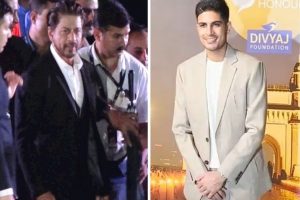K Manikandan, who was recently seen in ‘Aelay’, discusses the many hats he has donned — from a mimicry artiste and dialogue writer to becoming an actor
There was a point in Manikandan’s life when he felt he hit rock bottom. Starting out as a mimicry artiste, he was a runner-up amongst the 600-odd contestants in a television comedy show. He was recognised for his talent, but the question of survival became a reality when the show ended. The only other avenue which he thought was ideal to monetise from was to join radio. He worked as a radio jockey for over two years, before he quit to take up dubbing as a full-time profession.
“I have dubbed for most of the actors in Tamil cinema,” says Manikandan with childlike enthusiasm, when we meet at a café in Chennai. He was called for films that needed patch work, sometimes after the censor process, or if an actor was unavailable at that point. As a voice artist, Manikandan would meet and work with directors and actors at close quarters, but never had he approached them for an acting gig.
The desire to become an actor has always been there, says Manikandan. But every time he came close to taking the first step, he would put those thoughts aside for the kind of harsh reactions he had to face in the industry. “There are a lot of people who would put you down in the first meeting itself. I lost interest in acting because of the constant rejection and insults,” he says, adding that he went on to work as an assistant director in over 20 films.
Between 2011 and 2012, Manikandan became acquainted with a bunch of filmmakers — who would later be identified with the umbrella term ‘new-age’ — on the television show Naalaiya Iyakkunar, a short-film based contest that provided a platform for budding directors. He was on the verge of quitting, as nothing materialised from the show, when he got a call from filmmaker Nalan Kumarasamy, who had asked him to read the script of Kadhalum Kadanthu Pogum (2016). “He offered me the role of a car driver, but I didn’t know driving. I was asked to learn driving and that is how I got the part,” he adds, laughing at the mention of the cycle that began with Nalan and ended with Vignesh Shivan’s portion in Paava Kadhaigal, where he played a car driver again.
Even during that rough phase, Manikandan was never pursuant of acting. The only filmmaker with whom he opened up his desire to act was Halitha Shameem, who debuted with Poovarasam Peepee (2014). Though he later landed a much-talked-about character in Halitha’s sophomore feature, Sillu Karupatti (2019), Manikandan says it was for Aelay that she had approached him for initially.
Focussing on the dynamics between a father and son in a village in Tamil Nadu, Aelay, which was wrapped just before the pandemic, recently had its world première on television. It is soon dropping on Netflix. Manikandan too, is mildly disappointed for the film’s television release, although he admits that the reception for Aelay has been twice as big as Sillu Karupatti, which was a resounding success. “A good film will eventually find its audience. No doubts there. But theatre has its own charm. We have worked with the singular notion that 1,000 people would come and watch our film. That factor has been a miss,” he says.
Superstar approves
Manikandan’s career trajectory has been directionless, a fact he wholeheartedly accepts and laughs about. He is a mimicry artiste, radio jockey, dialogue writer, actor and director — in 2016, he directed an award-winning indie film Narai Ezhudhum Suyasaridham starring Delhi Ganesh — all at once. “I have half-baked knowledge in each department,” he says with a laugh.
He acknowledges that he is not a spontaneous actor; that he insists on reading scripts beforehand and rehearsing, so that he can eliminate the clichés that come with the character he is portraying. Though acting happened by chance, Manikandan says he gets a little miffed when people ask what drives him: acting or writing. Giving a measured response, he says: “You cannot separate both. The way I see it, when an actor wants to improvise for a scene, he inadvertently becomes a director.”
In his repertoire, his most recognisable yet substantial character, only second-in-line to the protagonist, came in Pa Ranjith’s political-drama Kaala (2018), in which he played Lenin, Rajinikanth’s son who goes against the father over ideological differences.
Ranjith liked the work Manikandan was doing with his YouTube channel and was later called to audition for a role, which he was not briefed about. Manikandan got the part, but was still clueless for over a week. Only when he reached out to an assistant and read the script did he realise the weight of the character. “The moment I understood I was playing Rajini sir’s son, fear started to creep in. I wasn’t happy for sure,” he says, adding, “Ranjith sir doesn’t act, but he creates an atmosphere where he would explain what is required. There was also the added pressure of working with the Superstar.”
Even before the audience lapped up Kaala and his character, Manikandan got a taste of success when Rajinikanth stayed back to watch him deliver a monologue. “Sir was supposed to leave after that shot, but he saw Ranjith sir taking a close-up of mine. He pulled up a chair and sat in front of me. I was sweating profusely and was on the verge of tears. But I regained myself since it was a make or break moment,” says Manikandan, “When the shot was over, they didn’t say ‘cut’ and I was standing there. Then, I saw someone through my peripheral vision. It was Rajini sir. He hugged and kissed me and said I did well.”
Another film which reaffirmed his belief that he was on the right track, as an actor, was Sillu Karupatti. An anthology, Manikandan played an unusual — by the standards of Tamil cinema — character, who is diagnosed with testicular cancer. Since the role came to him at an early stage in his career, Manikandan was sceptical about the way it would be received. “The character had enough qualities to become the butt of jokes. Halitha was confident and asked me to trust her, which I did. What truly surprised me was, there wasn’t a single negative comment about the character.”
Master of none
Manikandan prides himself on being a good conversationist, a quality which gave him the conviction to turn dialogue writer. His first brush with writing, however, came when he was a voice artiste and was out of work, forcing him to write dialogues for Telugu films dubbed in Tamil. He has written dialogues for over 12 dubbed films and learnt the art of writing on a “trial and error basis”. But the actual reason, Manikandan says, is the insecurity of being master of none. “Whether it is acting, writing or direction, I always feel insecure about myself and whether I have justified the part I have played in a film,” he says.
His biggest breakthrough, as a dialogue writer, was when Pushkar-Gayathri handed over the script of Vikram Vedha (2017) and asked him to write dialogues — upon Vijay Sethupathi’s suggestion. “The meeting lasted only minutes and on my way back, I kept thinking about what convinced them. Their trust superseded my insecurity as a writer,” he recalls.
The primary challenge for a dialogue writer is to understand the rhythm of the characters and where they come from, in addition to figuring out the contextual conversations, in some cases. Like for instance, in Vikram Vedha, Manikandan says that he wanted the conversations between Vikram (R Madhavan) and Vedha (Vijay Sethupathi) to begin abruptly without a starting point. “I asked Pushkar-Gayathri if we could do this and they were very impressed. It really helps if the characters are well-defined at the script level. Later, it is all about setting the metre right and holding discussions with the director(s),” he says.
Finding middleground
Discovering the character, their traits and state of mind takes time, but once he does, the experience is akin to “trance” and the words just flow. Ultimately, Manikandan agrees that it depends on what the actor brings to the scene. He also admits that dialogues are not holy texts and they are bound to change during the course of filming.
Recounting an incident that happened in Vikram Vedha, Manikandan says there was a scene where Vijay Sethupathi was supposed to get angry for a rebellion and there was a dialogue. Sethupathi, however, refused to say the lines, for, he felt it was not something the character would say at that instance. “That was a kind of revelation for me. Even in the climax, Vijay sir wanted to deliver a line in his fashion, which wasn’t the original idea. But he took us by surprise.”
Manikandan is unsure whether his background in mimicry has worked in his favour, but it has largely helped him think and enact like an actor. He remembers the time when Madhavan lost it on the set of Vikram Vedha when Manikandan was reading out the lines for him, and like him. “Maddy sir was like, ‘Don’t mimic me. I am forgetting my lines.’ He used to get so upset with me because he didn’t know I was a mimicry artiste. But he got used to it after a point,” says Manikandan, as he breaks into an impromptu expression of Madhavan, “However, it was different with Vijay sir because we go back in time. In fact, Vijay anna used to say, ‘I am going to deliver the lines like the way you did’.”
The process of writing is even more nerve-racking for a commercial film like Viswasam, in which Manikandan collaborated with fellow writers Siva, Ra Savarimuthu, Antony Bhagyaraj and Chandran Pachaimuthu. “Viswasam was supposed to be this serious, sentimental film. But we had the most fun working on it. Siva sir asked each one of us to write a version of the film, which was followed by a reading session. We exchanged notes and some of our ideas were similar,” he says.
Are directors in the space to take suggestions from writers? “Of course. Siva sir will sit and listen to you even if it’s 1am. If something is not working, he will explain why it isn’t. I got that space from both Pushkar-Gayathri and Siva.”
But is there a stark difference in terms of writing for a star, as opposed to a more plot-driven narrative like Vikram Vedha? “In the former, you have to consider the star’s image when you write dialogues. How do you camouflage certain things that we write for a star into the character, is a challenge. For a commercial film, it is not a question of whether it is right, but who it is for,” says Manikandan, who also wrote the dialogues for Thambi, directed by Jeethu Joseph.
Manikandan says he thoroughly enjoyed the solitude, thanks to the pandemic-induced lockdown. He used the time to read and write and try stop-motion films. He will soon be starring in Netrikann, produced by Rowdy Pictures, and has written for his friend Vishal Venkat’s yet-untitled project. There is also a plan to direct a film by the end of this year, “I’ve been reading some impressive scripts that are yet to be made into films. I’m working towards bringing them on screen — either as writer, actor or director.”



Add Comment